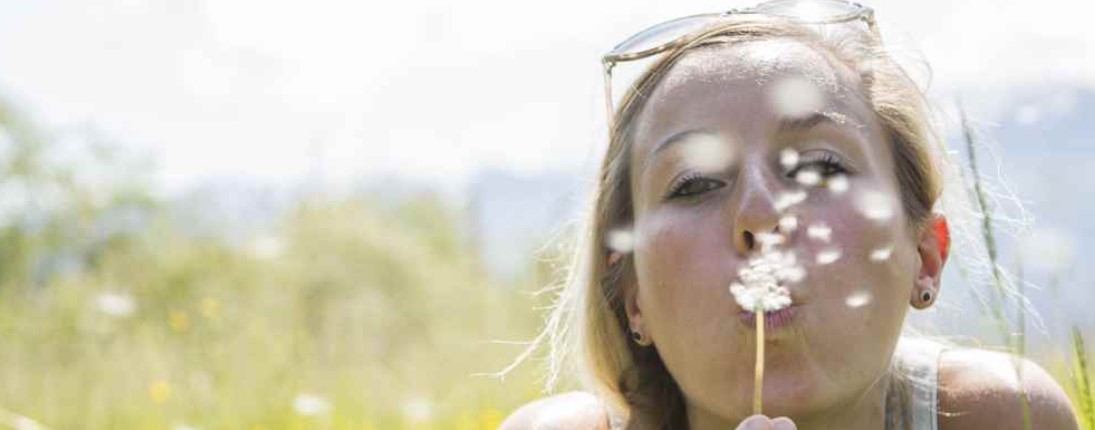
As spring gets underway, do you suffer with any of these symptoms … runny nose, itchy eyes, wheezing, streaming eyes, sneezing, itchy throat, red eyes?
This could be hayfever or it could be allergic rhinitis, which is a non-seasonal reaction to airborne allergens with hayfever-like symptoms. Allergic rhinitis symptoms can happen at any time of the year, and can sometimes appear later in life, especially during the menopause years.
Hayfever season
Hayfever fluctuates in severity depending on the time of year, as different pollens are released at different times of the spring and summer. Each individual person tends to react to their own ‘set’ of pollens, and may therefore experience symptoms at differing times to other hayfever sufferers.
- Grass pollination – mid-May to July
- Tree pollination – March to mid-May
- Weed pollination – June to October
Whether it’s hayfever or allergic rhinitis, let’s look at the causes and what can be done about them, along with some diet and lifestyle tips to help reduce symptoms.
Hayfever is a type of allergic rhinitis where the allergen your body is reacting to is pollen. An allergy to pollen affects around 25% of the UK’s population1. Contact with tree, weed or grass pollen can all bring on hayfever symptoms, though grass pollen is the most problematic – 95% of all hayfever sufferers are thought to be allergic to this2. Grass pollen mainly makes its presence felt from March to October. You may suffer all summer!
Symptoms occur when the immune system overreacts to contact with tree, weed or grass pollen. Instead of ignoring these things as would normally be the case, the immune system initiates a response to kill them, as it would do with a cold virus for example, or troublesome bacteria.
This response involves releasing a chemical called histamine which, in excess, can lead to a host of unpleasant symptoms that can include: itchy eyes, sore throat/cough, blocked ears/earache, runny/blocked nose, sneezing, itchy skin/skin rash, headaches, and fatigue.
Allergic rhinitis happens when the immune system over-reacts to a harmless airborne particle, rather than just letting it pass by. This reaction can be triggered by a wide range of substances, not just pollens.
As part of this response, it releases a chemical called histamine which, in turn, can cause inflammation of the mucous membranes lining the nose. This encourages secretion of thick, sticky mucus to trap the foreign particles.
Symptoms of allergic rhinitis can occur at any time of the year and, as noted above, in response to a wide range of triggers. It is far more of a long-term problem than hayfever.
The symptoms of allergic rhinitis can be very similar to a common cold infection, and usually occur immediately after coming into contact with the particular substance or substances to which your immune system has decided to object. These symptoms may include: watery eyes, itchy eyes and throat, runny nose, head and/or nose feeling stuffy, loss of taste and smell.
Usually, these problematic symptoms ease quickly as you move away from the troublesome substance. House dust mites, mould and flakes of dead skin from animals are all common allergens that give rise to allergic rhinitis.
Alleviating the Symptoms
Whether you suffer from hayfever or allergic rhinitis you can alleviate the symptoms in several ways by trying A.Vogel’s Pollinosan products.
You can try A.Vogel’s Pollinosan Hayfever Tablets. These work to address a whole range of symptoms. Pollinosan Hayfever Tablets are made from 7 tropical herbs which, together, address symptoms including sneezing, watery eyes and congestion. They are non-drowsy so will not affect your ability to go about your day-to-day life, and can be taken in combination with medications such as antihistamines, as well as alongside A.Vogel’s other herbal remedies. If a specific problem is troubling you, another one of our other remedies may add extra benefits.
You could also try A.Vogel’s Pollinosan Hayfever Nasal Spray, which provides protection against pollen and other airborne irritants and allergens. It also reduces inflammation of the nasal mucosa caused by allergies, which in turn alleviates symptoms such as runny nose, blocked nose, and itchy nose. It stabilises the nasal mucosa and supports healing and regeneration of the nasal membranes. This product is vegan and suitable for both adults and children. It is preservative-free and appropriate for those with high sensitivity.

If you suffer from itchy or red eyes, then A.Vogel’s Pollinosan Hayfever Eye Drops could be the perfect solution for you. They are also vegan, and contain moisturising hyaluronic acid alongside soothing chamomile. Suitable for those over age 7, they are also preservative-free and therefore appropriate for highly sensitive eyes, and for ongoing use. Currently on special offer of £6.99 (during April 2024).

References:
[1] https://www.metoffice.gov.uk/health/public/pollen-forecast/ when-is-hayfever-season
[2] https://www.telegraph.co.uk/health-fitness/body/many-peoplesuddenly-suffering-hay-fever-middle-age/

